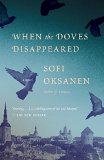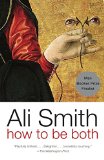Summary | Excerpt | Reviews | Beyond the book | Read-Alikes | Genres & Themes | Author Bio

On the surface, Stork Mountain, Miroslav Penkov's debut novel, is about a young man's search for his grandfather, but it quickly evolves into a multi-layered tale of love, loss and self-discovery.
The book's narrator – when referred to at all, is called "boy" or "The American" – ostensibly returns to his native Bulgaria to find his grandfather who stopped communicating with his family in the United States three years prior. When this mission is accomplished fairly easily, the protagonist chooses to remain with Grandpa in the tiny hamlet of Klisura in the Strandja Mountains (aka Strandzha, pronounced Strand-ja), and it becomes clear his motives are much less altruistic than they first appeared. What follows is a series of revelations that lead him to understand not only Grandpa's history but his own as well.
The book — the title of which refers to the storks which nest in the area — is complex in plot and writing style, both of which I found intriguing and original. Every time I thought I knew what the novel was about or where it was headed, the story took an unexpected turn, leaving me rather astonished at times. The work is populated with unusual characters beyond the boy and his grandfather. They include a Muslim cleric and his two daughters, one of whom claims to be a traditional fire-dancer (see 'Beyond the Book'); and an ancient woman with a mysterious past - all of whom play key and unexpected roles, interconnecting in unexpected ways. The wide range of characters allows Penkov to set up and resolve a variety of tensions between the inhabitants of Klisura, which in turn serves as a microcosm of some of the pressures facing much of the world today. These are strains that appear between Christians and Muslims, young and old, fact and superstition, progress and preservation.
Beyond the surface tensions, each character struggles with inner turmoil, constantly striving to understand the reasons for their behavior as well as those around them. Penkov skillfully captures the complexities of human nature; none of his characters are flawless or consistently makes good decisions. As more information is revealed about each, sometimes in plot twists that made me gasp, it becomes clear that no one is truly acting in good faith. It's yet another mark of the author's talent that the reader comes to love and sympathize with the characters in spite of their failings or, perhaps, because of them.
Bolstering the primary story are tales from Bulgaria's recent history, (particularly the impact Communism has had on community members), Slavic mythology and the narrator's family history. At first these ongoing subplots seem a bit random and unrelated to current events, but as they interweave and the overall narrative progresses, their inclusion not only makes sense but seems to be a stroke of genius. Penkov's writing adapts seamlessly as he moves between fable and history, with the text sometimes reading like a fairy tale, sometimes like a personal journal. It is difficult to juggle seemingly disparate threads and narrative styles, but the author accomplishes this task with extraordinary skill.
Many readers have a 50- or 100-page rule, whereby they abandon a book if it hasn't grabbed them by that point; Stork Mountain is one that may require more patience. I personally couldn't figure out what was happening for at least the first 80 pages and often wondered where the story was going, or, indeed, if there was a story at all. There are short sections even late in the book that I re-read to understand. In addition, it took me a while to settle into the author's writing cadence; although written in English, the book has a foreign-language feel to it, reading more like a translated work. I found this somewhat off-putting at first, but again, after the first 80 pages or so, I noticed this dissonance much less. I recommend that readers resist the urge to put this one down too soon; ultimately the book transcends these obstacles, and indeed, they may not even be a distraction.
Stork Mountain is one of the more extraordinary novels I've read recently. The plot, setting and characters are all unusual and captivating, and the author's ability to forge these diverse elements into a compelling story is nothing short of stunning. The novel might not work for everyone, as it does require a bit of perseverance to get to the meat of it, but those looking for a departure from the standard fare will likely find this one a winner.
![]() This review was originally published in The BookBrowse Review in April 2016, and has been updated for the
April 2017 edition.
Click here to go to this issue.
This review was originally published in The BookBrowse Review in April 2016, and has been updated for the
April 2017 edition.
Click here to go to this issue.

If you liked Stork Mountain, try these:

by Sofi Oksanen
Published 2016
From the acclaimed author of Purge ("a stirring and humane work of art" —The New Republic) comes a riveting, chillingly relevant new novel of occupation, resistance, and collaboration in Eastern Europe.

by Ali Smith
Published 2015
Two tales of love and injustice twist into a singular yarn where time gets timeless, structural gets playful, knowing gets mysterious, fictional gets real—and all life's givens get given a second chance.
Your guide toexceptional books
BookBrowse seeks out and recommends the best in contemporary fiction and nonfiction—books that not only engage and entertain but also deepen our understanding of ourselves and the world around us.